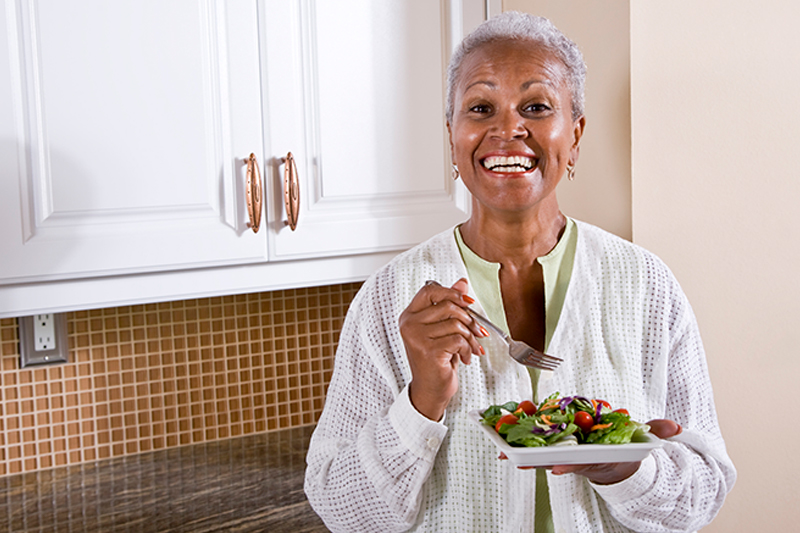
Healthy meals for seniors can become a habit by following these easy tips.
Remember family dinners at Grandma’s house? The tantalizing scents wafting out from the kitchen would draw everyone in to take pleasure in her home cooking. There were always a lot of leftovers for future meals or late-night snacks.
Unfortunately, healthy meals for seniors can be infrequent for a variety of reasons. The day-to-day reality might be that seniors are facing one of a number of challenges to good nutrition, including:
- Not wanting to bother with planning a nutritious meal for just one or two people
- Health conditions that make it challenging to tend to the tasks of grocery shopping and cooking
- Medication side effects that impact appetite or how food tastes
- Loss of taste and/or smell
Overcoming the Hurdles to Good Senior Nutrition
For seniors facing the difficulties above, or any others, these recommendations will help.
- If loneliness during mealtime is an issue, older adults can network with friends for potluck dinners, experimenting with new recipes together, or going out for meals. Other choices include congregate meals at senior centers, Meals On Wheels, or a companion from Live Free Home Health Care, providers of award-winning care at home in Bristol, New Hampshire and other nearby areas.
- Grocery shopping and preparing meals may be challenging. There are a number of companies that now offer healthy, ready-made meals delivered straight to your door. Grocery delivery service or curbside pickup are also ideal for older adults. A caregiver from Live Free Home Health Care is also available to pick up groceries, prepare meals, and clean up the kitchen afterwards.
- Lack of taste or smell may make foods unappealing, but adding herbs and spices to recipes will help. Make certain to limit salt, however. Try bright-colored fruits and vegetables in a variety of textures for visual and textural appeal.
- Review medications with the prescribing physician to determine if there are other treatment options that will not affect the senior’s appetite.
Easy Steps to Better Senior Nutrition
These strategies can help ensure seniors are on the right track to a healthy diet.
- Choose foods that are high in nutrients but lower in calories, like vegetables and fruits, whole grains, lean meats and seafood, beans, nuts, seeds, and low-fat or fat-free dairy products.
- Skip (or at least limit) the amount of empty calorie foods, such as cookies and other baked goods, chips, candy, soda, and alcohol.
- Stay hydrated. Many older adults lose the sensation of thirst as they age, so it’s essential to drink sufficient water through the day, whether feeling thirsty or not.
- Physical activity often helps increase appetite. Consult with a doctor for an ideal exercise program.
To obtain additional helpful resources related to improving senior nutrition[MaMM3] , as well as for hands-on help with eliminating the difficulties being faced, contact Live Free Home Health Care, providers of trusted care at home in Bristol, New Hampshire and other nearby areas, at 603-217-0149.
